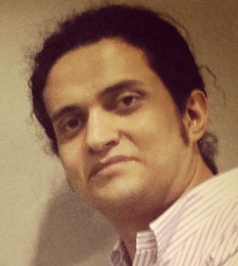
The European Saudi Organization for Human Rights (ESOHR) expresses deep concern over the continuation of the Saudi judiciary to issue death sentences based on charges of freedom of opinion and expression. In a new provision, Abha court sentenced Palestinian poet and artist Ashraf Abdel Satar Fayyad to death on 17th November 2015.
Fayyad, was born in Saudi Arabia (15th July 1980) and lives in an area between the cities of Jeddah and Abha. He is well know for his have artistic activities and held a variety of posts within Saudi Arabia, as well as being a memberof the organization ‘Edge of Arabia’. On the 6thAugust 2013 a complaint was submitted against him to the ‘Commission for the Promotion of Virtue and Prevention of Vice’ (religious police) in Abha. The charges against Fayyad included spreading atheism and infidelity, spreading doubts and blaspheming ‘The divine self’, mocking Prophet Muhammad, insulting the Saudi state and publishing a book entitled ‘Instructions within’. Based on these accusations, the authorities arrested him on the same day, after whichhe was released on bail the next day (7th August 2013) by the commission whilst they completed their investigation.
The Commission began its investigation via a Publishing house in Assir where it made enquiries about his book and found that it had been banned from trading. They also monitoredhis twitter account and criminalizedsome of his tweets. Furthermore, Dar Al-Fatwa found that his book contained blasphemous statements in reference to ‘the divine self’ and mocked religious texts.
On the 1st January 2014 ‘the Promotion of Virtue and Prevention of Vice’ police rearrested him based on an arrest warrant issued by the Investigation and Prosecution Authority, where he was held at Abha police station. Almost a month later, on the 28th January 2014, he was transferred to the general prison in Abha.
The prosecution proceeded based on several charges: Violation of public decency, insulting ‘the divine self’ as well as ridicule, Insulting the Holy Prophet, spreading atheism, discrediting the Quran and Hadith, objecting to concepts of fate as acts of God, the denial of the Baath, and the presence of photos of women saved on his mobile. Some charges filed against Fayyad relate to prosecuting judges personal interpretation of his writings, as well as religious interpretations based on Saudi official religious ideology. This was done without having any regard for the testimony and explanations offered by Fayyad, who expressly negated the interpretation adopted by the prosecution. Based on these charges, the prosecution demanded sanctions against him which should encompass the punishment of one who is an apostate from Islam. Such a crime means that the accused will be murdered, as according to execution procedures in Saudi Arabia for apostates, it will be incumbent that Ashraf Fayyad is beheaded by sword.
The prosecution occurred at Abha General Court over seven court sessions in total which began on the 12th February 2014 and ended on the 3rd April 2014. The judge found that Fayyad agreed to repent and witnesses were presented who testified to his innocence from the charges, whilst witnesses brought forward by the prosecution testified against him. Therefore the charge of apostasy was warded off, so he received a sentence of 4 years in prison and 800 lashes. Fayyadobjected to this sentence, and the Prosecutor and raises the case to the Court of Appeal.
After more than 20 months since the issuance of the initial judgment, on the 17th November 2015, a court session was held which considered comments arising from the Court of Appeal, and the judge rejected the certificates that proved Fayyad’s innocence, and he was sentenced to death under the pretext of him becoming an apostate.
Fayyad, whodid not have access tolawyer during the trial and even up till now, has alast chance tofile an objectiontothe death sentenceissued on the 17thNovember. There is a maximum period of30 daysfrom the date ofthe judgment to file this.
ESOHR confirms that theverdicton issued against thepoetFayyadis aviolation of several internationalchartersand international laws, that confirmand emphasize theright to life, freedom of thought, conscience and religion, andguarantees the rightof expression. In particular, it contravenes the Arab Charter onHuman Rights, whichjoinedinArticle 6 ‘no one shall be sentenced to the death penaltyexcept for very seriouscrimes), and Article19 (1) of the InternationalCovenant on Civiland Political Rights ‘Everyone shall have the right to hold opinions without interference’.
Theexecutionscarried out inSaudi Arabia in2015 have reached their highest levelssince 1995, reaching 152executionsup untilthe 9thNovember 2015.Many of these executions arebased onnon-serious crimes, and executionsbased on the sentences related to freedom ofopinion are on the rise.
ESOHR calls upon the Saudi governmentto release ofthe poet Ashraf Fayyadand dropthe death sentence, as well as stop all death sentencesbased on chargesrelated (or partly related) to the freedom of opinion or expression. We also urge the Saudi authorities to workto harmonizejudicial decisionsin accordancethe international conventionsthat Saudi Arabia has ratified, and to ensure thatall trialscomply with internationally agreed fair trial principles.Furthermore, in the case of unfair trials, their proceeding should be made void, as in the death sentenceissued against Jordanian detainee Hussein Abu al-Khairwho sentencedto deathon drug-related charges after a trial marred with due process concerns.
We at ESOHR express our deep concernover the fate ofthe poetAshrafFayyad, especiallywiththe existence ofprecedentswhich show that implementation of such a death sentence commonly occurs in the case of apostasy. This was the case when the Saudi government executed Sadiq Abdul Karim Mal Allahon the 3rdSeptember 1992, on the groundsthat heinsulted God and His Messenger, despite a lack of evidence for these charges.
ESOHR urgesthe international community toact swiftlyin the case of poetAshrafFayyad and to demandthat all charges are dropped charges against him and he is immediately released.
